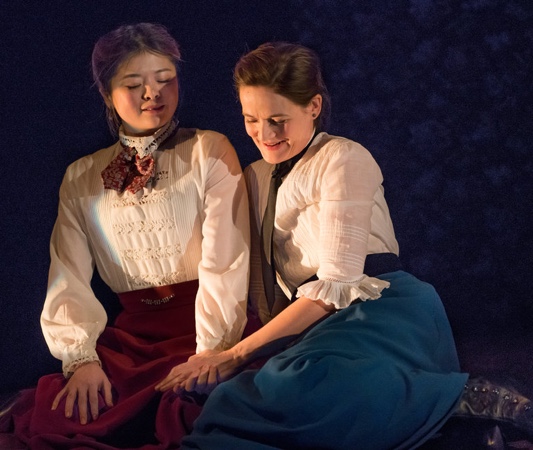Behind the Scenes in the Early Women’s Movement as Seen Through the Eyes of a Playwright

It is the turn of the twentieth century and Mary Woolley, 38, a strident feminist, has just become the President of a women’s college in Massachusetts, one of youngest Presidents in U.S. history. She is the bull in the china shop, she says, knocking over everything in sight. “Revolution!” she shouts when anyone asks her what her intellectual theory is. She strides about the stage with determination and force.
She was a lesbian, too, and falls in love with Jeannette Marks, an attractive English professor who agrees with her stands on many issues but is not so much a hardliner on them. The two of them embark on what might have been a quiet satisfying relationship amid the lovely forests and ponds of New England.
But it is the dawn of the twentieth century and women still cannot vote. Woolley and Marks will help to change that, and fast. They lobby with others, lead protest marches and demonstrations. One night Marks and several professors, along with some students, get arrested and are put in jail. Woolley’s women’s program at the school, wildly liberal, is criticized by alumni. She gets rid of male professors and hires women. She does not rehire most of the faculty. She becomes a lightning rod of controversy and pulls everybody, from young Jeannette Marks to old and crusty Dean Welsh, into the maelstrom with her.
Woolley and Marks are the heroines of Bull in a China Shop, the impressive new play by Bryna Turner that opened last week at the Claire Tow Theater at Lincoln Center, in New York. The play is the mostly true story of educator Woolley and Marks, her lifelong companion. Woolley was actually President of Mount Holyoke College. Turner used hundreds of love letters between the women as the basis for the story.
What is interesting about the play, with an all-woman cast, is that it is the same story that heterosexual couples have had on college campuses for over a hundred years. Male professors, or Deans, and Presidents, have been romancing and marrying women teachers, and students, for generations. This lesbian couple is not different. People are people, regardless of their sexual persuasion or the era.
What really stands out about Bull in a China Shop is the history. The audience learns a great deal about the women’s movement, from 1899 to the start of World War II. You learn of its successes and failures and, when the vote is won, the problems that ensued. You also learn a great deal about the administration of women’s colleges and how charismatic, far thinking women like Woolley are only allowed to succeed to a point. They reach the proverbial line in the sand and dare not cross it. Woolley did and all hell broke loose.
Director Lee Sunday Evans did a fine job in keeping the play moving along. There are places where the tempo might have died down but she kept it taut. She did fine work in getting wrenching performances out of all the actors. She also did a good job of setting up emotional confrontations. At one point, Woolley takes off for China for six months and leaves Marks alone at home. Marks quickly slides into bed with Pearl. World War III breaks out when Woolley returns. It is a wonderful scene.
Everybody in the cast was superb. Enid Graham was an often tough but at times sensitive Woolley, who always soothed over her feuds with Jeannette with a bouquet of flowers. Jeannette, a different type of character, was played well by Ruibo Qian. Lizbeth McKay was the stern and traditional Dean Welsh. Crystal Lucas-Perry played another professor. Feisty Michelle Selene Ang play Pearl and delivers the best monologue in the play, one of the best in theater in years, when she rails against Marks for dumping her in favor of her longtime lover Woolley.
One mistake in this otherwise commendable drama: the playwright claims that Hitler ran Germany in 1932 and that same year he invaded Poland. Hitler came to power in ’33 and invaded Poland in 1939.
Historically, Woolley and Marks accomplished great things at Mount Holyoke. They made it one of America’s finest Universities. Today a grand hall there is named after Woolley and another building after Marks. History did remember them after all. People will remember this fine play, too.
PRODUCTION: The play is produced by Lincoln Center Theater, Sets: Arnulfo Maldonado, Costumes Oana Botez, Lighting: Eric Southern, Sound Broken Chord. The play is directed by Lee Sunday Evans. It runs through April 2.